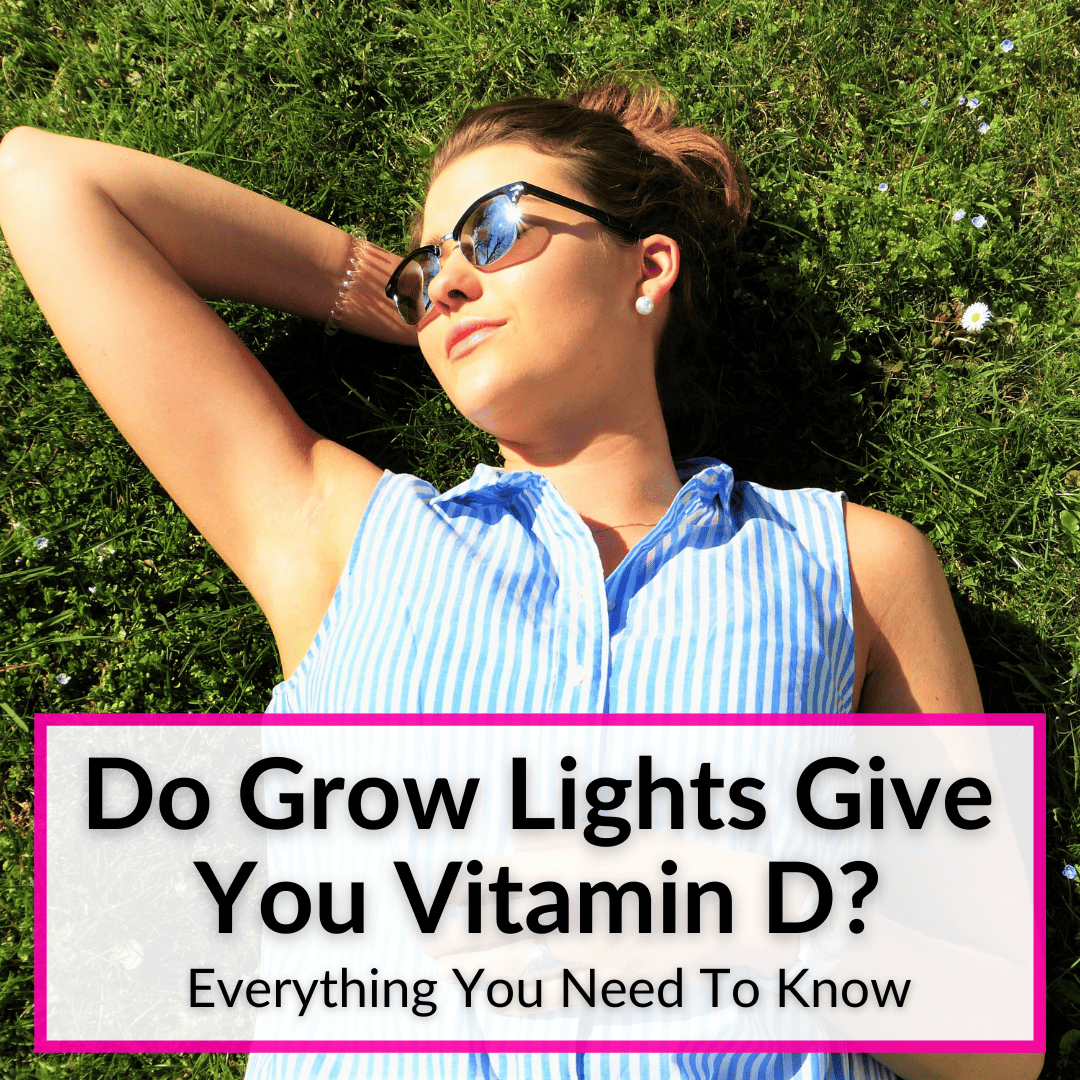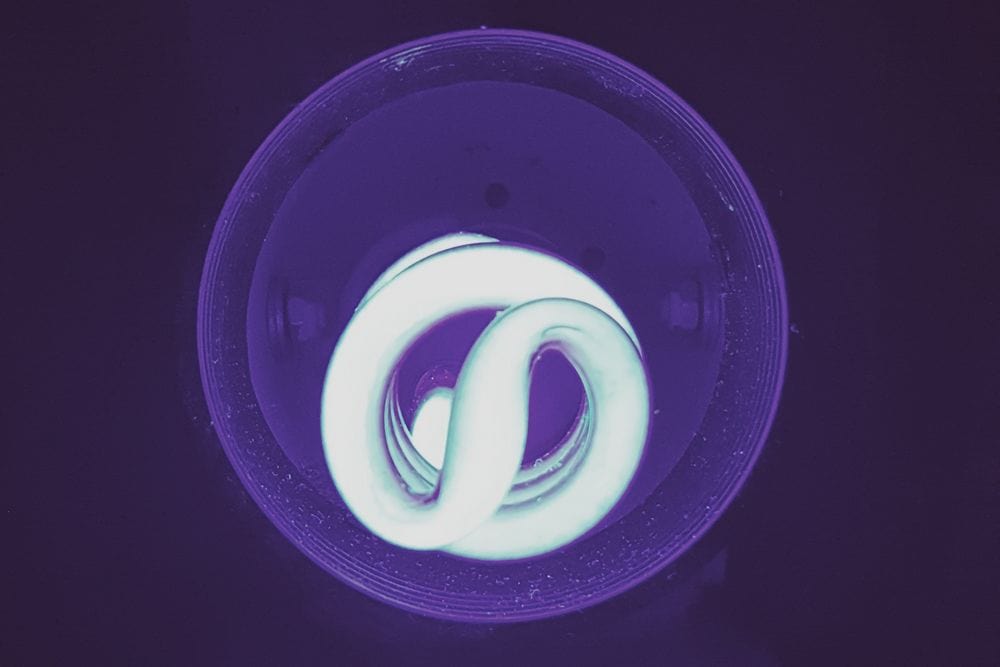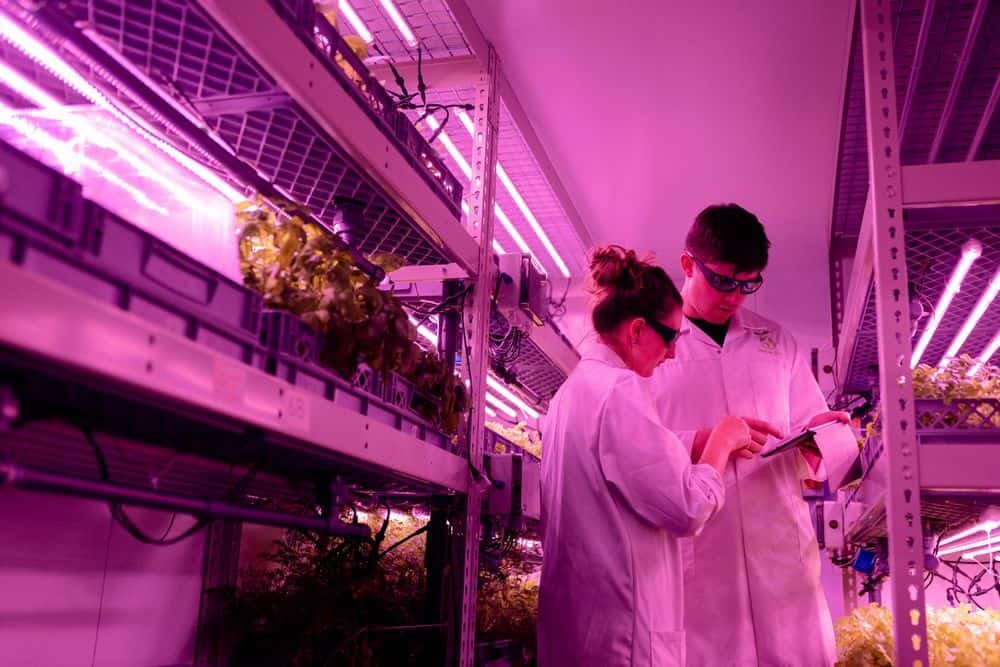 Vitamin D is an essential nutrient.
Vitamin D is an essential nutrient.
We need it for many important bodily functions, including bone health, immune function, and cell growth.
We can get vitamin D from certain foods, and also from the sun.
Since grow lights replace the sun, the obvious question is: do grow lights give you vitamin D?
The answer, however, is not a simple yes or no.
That’s because only a certain wavelength of light stimulates our skin to produce vitamin D.
Keep reading to find out exactly what type of light produces vitamin D and what that means in terms of grow lights providing us with this essential nutrient.
Contents
Do Grow Lights Give You Vitamin D?
Some grow lights can give you vitamin D, but most do not. It is UV-B light that stimulates our skin to produce vitamin D, so only grow lights that emit UVB light will give you the vitamin.
The sun is the primary source of vitamin D for humans, because our skin produces vitamin D when it is exposed to ultraviolet (UV) radiation. But you can also get it from certain foods, such as fatty fish, eggs, and fortified milk.

However, there are many people who do not get enough vitamin D, either because they live in northern latitudes, spend a lot of time indoors, or have a poor diet. Are grow lights an answer?
Grow lights are artificial lights that are used to help plants grow indoors. They can help with vitamin D production in humans, if the light in question emits UV-B wavelengths (as the light from the sun does), which trigger the skin to produce vitamin D.
Why Vitamin D Is Important And How To Get Enough
Vitamin D plays a crucial role in many bodily functions. It helps the body absorb minerals, such as calcium and phosphorus, which are essential for strong bones and teeth.
Vitamin D also supports immune function, muscle development, cell growth, and may offer a number of other potential health benefits, such as reduced risk of heart disease, stroke, type II diabetes, multiple sclerosis, rheumatoid arthritis, improved cognitive function, and a reduced risk of depression.
The recommended daily intake of vitamin D for adults is 2000 IU (international units). However, some people may need more vitamin D, such as older adults, people with darker skin, and people who do not get much sun exposure.
There are three main ways to get vitamin D:
- Diet: Vitamin D is found in a few common foods, including fatty fish (such as salmon, tuna, and mackerel), eggs, and fortified foods (such as milk, cereal, and orange juice).
- Supplements: Vitamin D supplements are available in the form of capsules, tablets, and drops from your local pharmacy.
- Sun exposure: When your skin is exposed to sunlight, it produces vitamin D. It is important to note, however, that too much sun exposure can increase the risk of skin cancer.
To get enough vitamin D from natural sunlight, most adults need to expose their bare skin to the sun for 10 to 15 minutes, two to three times a week. But the exact amount of exposure you need depends on where you live and how strong the sun’s rays are at that latitude. And again, you should take precautions against sunburn.
Can Grow Lights Give You Vitamin D?

Yes, but not all grow lights are the same. Only grow lights that emit UV-B radiation can stimulate vitamin D production in the skin, but those that don’t can’t.
UV-B radiation is the type of ultraviolet light that is essential for vitamin D production and tanning, but it is also the type of UV light that causes sunburn and, potentially, skin cancer.
For this reason, it’s important to use grow lights sparingly and safely when trying to increase your vitamin D levels. To get vitamin D from your grow lights, you will need to expose your skin to the UV-B light for a certain amount of time.
The amount of time needed will vary depending on the intensity of the UV-B light and your skin type. Those with lighter skin may need less time than those with a darker skin tone.
Here are a few safety tips to bear in mind when using grow lights to increase your vitamin D intake:
- Make sure you choose a grow light that emits UV-B radiation.
- Start with a shorter exposure time, such as 5 minutes, and gradually increase the exposure time as tolerated.
- If you experience any skin irritation, such as redness, soreness, or burning, stop using the grow light immediately and have a chat with your doctor.
- It is also important to note that grow lights can be harmful to your eyes, so it is vital to wear protective goggles when using them.
What Kind Of Grow Lights Can Produce Vitamin D?
Not all grow lights emit UV-B radiation, and those that do may do so at different levels. Some grow lights are designed specifically to produce UV-A radiation, which is the type of UV light that plants need for photosynthesis.
Other grow lights are designed to produce a full spectrum of light, including some UV-B radiation, but these full-spectrum grow lights may not emit enough UV-B radiation to produce significant amounts of vitamin D in humans.
If you are looking for a grow light that can help you produce vitamin D, you need to choose a light that specifically emits UV-B radiation. They are rare, because while UVB light helps plants, it is not necessary for them.
The UV-B-specific grow lights that do exist are available in a variety of sizes and shapes. If you like, you can use them to supplement your vitamin D intake during the winter months or if you have limited exposure to sunlight.
Here are some examples of lights that can help you produce more vitamin D:
UV-B LED Grow Lights

These grow lights use LED technology to produce UV-B radiation. UV-B LED grow lights are more energy-efficient than traditional UV-B lamps, and they can also be used to grow your plants at the same time. The drawback is that UVB LED diodes are expensive.
Full-Spectrum Grow Lights With UV-B Radiation
Full-spectrum grow lights emit all wavelengths of light, including UV-B radiation. However, it is important to check the specifications of the grow light to make sure that it emits enough UV-B radiation to produce significant amounts of vitamin D in humans. Also, most LED grow lights labeled as “full spectrum” do not actually emit any UVB. Many do not emit any UVA either.
UV-B Lamps
These lamps are designed to emit UVB radiation at a wavelength that is safe and effective for humans. UV-B lamps are typically used for phototherapy (light therapy) rather than for growing plants, but they can also be used to help you produce vitamin D.
Other common uses of UV-B lamps are for reptiles or aquarium plants. They can also be used to sterilize things, since UVB light kills germs.
Can You Get Vitamin D From LED Grow Lights?
Yes, you can get vitamin D from LED grow lights, but only if they emit UVB wavelengths. The problem is that almost no LED grow lights do. UVB diodes are expensive, so LEDs that include UV light always have UVA, not UVB. However, there are a few specialized UVB fixtures available,
Do Grow Lights Help With Vitamin D: Final Thoughts.
Our skin produces vitamin D when it is exposed to sunlight. Specifically, it is the UVB portion of the sunlight that causes vitamin D production. Do grow lights give you vitamin D, if they emit any UVB light?
Yes, any grow light that emits UVB wavelengths can give you vitamin D. However, most grow lights do not emit any UVB. And some of those that do emit so little that you won’t get enough vitamin D from them.
In the end, you can certainly use the right grow lights to get vitamin D. But unless you already have those grow lights, you should not go out and buy one specifically for this purpose. You would be much better off just eating the right foods or getting some supplements.
But if you are already using a grow light that emits UVB wavelengths for your plants, you could go ahead and expose yourself to the light to get some additional vitamin D. Just make sure you do not stay under the light for too long. Grow lights can be harmful to humans, specifically due to the UVB radiation.
Anonymous says
thank you